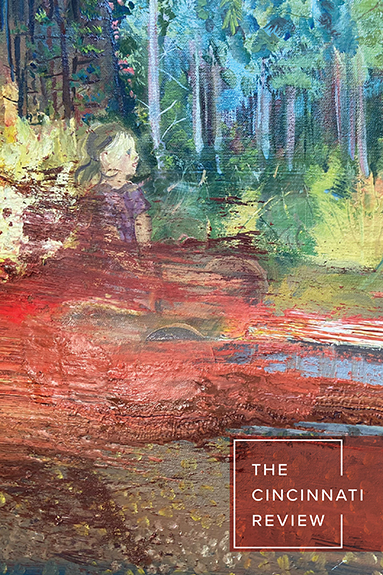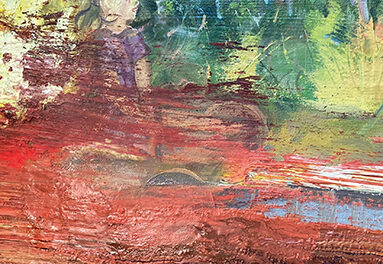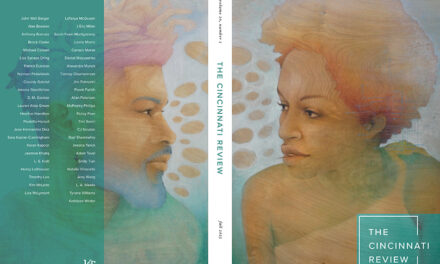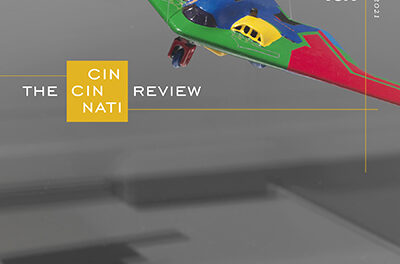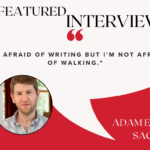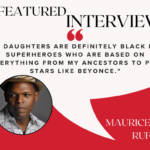We’re driving the largest cleanup in history. . . . We let the plastic come to us, using the ocean currents in our advantage.
—Boyan Slat
Dear Boyan Slat,
Honestly, I thought it was beautiful how after the rain drenched everything, the creeks rummaged through the holler, coaxing out all the plastic milk jugs and Clorox bottles and grocery bags. Afterward, that stuff hung in the trees at the waterline, like memories of days in people’s lives—days that would otherwise have been lost in the murky depths of time.
Listen to me. The murky depths of time.
Maybe this has something to do with my being born in a town that was flooded over when they built the dam. We don’t live there anymore, obviously. We moved to Rowan County when I was seven. But being born in a submerged town is something like being born with a caul, as far as I can tell. You see things through a glass, darkly. Though a caul is supposed to be lucky, and Mr. Slat, I’m about as unlucky as a cake in the rain. Referring to a song my father loved in the version by the awful and ancient Ray Conniff Singers. And that brings me to the Tupperware cake-storage container my mother purchased when their love failed. My first experience of plastic as grace. Salvation. I shouldn’t be leading with this. It certainly isn’t my best foot forward in a letter to a guy who famously wants to clean up the world’s overabundance of ocean-bound plastic. It’s an honest foot though.
Also, there was the plastic glow-in-the-dark cross I kept in a shoebox in the closet after a week at Vacation Bible School. All of this in a family that started out believing in wooden toys and strictly cotton underpants.
Are you surprised that I’m writing all the way from America? I’m sending it in an actual letter in hopes you won’t ignore it as shitposting. And that’s a maybe. Maybe I’m sending it.
I’ve gotten past the religious stuff—nothing a summer of preachy work in the Appalachian hollers wouldn’t cure me of. It was supposed to be a soul-winning thing—sharing the gospel with the underprivileged back in Perry County—but instead it was a graphic illustration that what seemed true for one little body just really had nothing to do with lots of other people, a Cinderella shoebox cross that didn’t fit. People there had nothing and saw lots of bad shit happen, shit I really hadn’t taken into account, and even had their own ideas about happiness and beauty. But the plastic endured, as well you know it does! And still with a surreptitious glow that tells me I haven’t seen the end of it.
Dear Boyan Slat,
Today’s letter is mostly a confession. Back from my morning run, I’m sitting out under the sweet-gum tree in the yard of our house, and it’s been two days since Aldo Leopold died. We buried him in a box and—don’t ask me why—put him in a plastic bag inside. More hygienic, I guess. Also, there’s a sweat bee on my arm. (Aldo was a cat, by the way.) I’m eating yogurt to make myself feel better, the blended kind that comes in plastic mini-cups. I’ve eaten four of the six in the pack—and with a plastic spoon. I’d ask if you thought less of me, but I know you don’t think of me at all, or didn’t, at least, until you maybe got my last letter and maybe read it. I know you’re a busy person.
Sitting here, I’m surrounded by creeping Charlie and weedy violets that have taken over the lawn. In the house, there’s a three-layer Lady Baltimore cake in my mother’s Tupperware container. She made it as consolation for Aldo’s passing. In conclusion, death is the mother of plastic. But so is infidelity, I guess.
It was after my father left that my mother and I converted: a plastic slide in the yard, plastic straws in plastic orange-juice bottles, and, for my birthday, balloons made of Mylar (isn’t that plastic too?) spelling out the happiness she wished for me—the very happiness they had destroyed. I suppose you could say I am, somehow, though not profoundly, unhappy.
I’m not asking for absolution. I now believe that we live with the consequences of our actions. The same way my mother had to live with the red hair she got out of a bottle, even though it made her look like a failed teenager or the last stand of a dying coral reef. I think she hated it too, but she wore it first as an act of defiance, since my father had loved her natural dirty-blond, and later as proof that she knew what she was doing. Why are psychologists always the last to see what’s going on in their own heads? I should talk though.
I’m nineteen and working part-time at the Piggly Wiggly, still living at home with my mother. In my own defense, I’m thinking about community college next year. Or something. Somebody at the high school saw me out running the other day and now they’ve asked me to coach the girls’ track team. LOL. My only excuse not to is that I’m completely unqualified.
All of this to say, I imagine you somewhere out in the middle of the ocean with your team, waiting for the rain to wash these little blueberry Dannons down the gully and into the river and across half a continent to your magnificent filtration net. Maybe you would know me then—a loser with modest aspirations to change.
Dear Boyan (okay if I call you Boyan?),
I guess my mother and I were only looking for eternal life. Or, short of that, extended expiration dates. I sucked air through a plastic snorkel the first time I went underwater at the dam at Buckhorn Lake and I wore plastic goggles when I swam with my cousins at Beaufort, South Carolina. I can’t deny that plastic is the comfort of my generation—its puffy constellations of play equipment, the promise of health in bottled water, the handy food-storage bags full of Goldfish or Cheerios we grew up on, the makeup compacts that were the foundation of our first loves. Even the Lycra in my leggings. Plastic is newness and fun. It’s freshness and flexibility. Radical persistence. Dashboards and bird feeders and cafeteria trays and sleds. Sunglasses and floaties. Now I feel a little like an addict, looking to be free of the necessary substance.
Mr. Slat:
I don’t get far without it. I’m frantic in the kitchen, waving a lettuce leaf. Or at Piggly Wiggly, I get dirty looks from my fellow cashiers when my radishes dribble down the belt, making mud with the soil from loose mushrooms. And that’s just me trying to put together a simple salad for my mom and me without causing the demise of the planet.
But this isn’t about me at all. Admittedly, I am a person who used to love dumps and junkyards. To see so much that was cast-off and broken—the torn vinyl upholstery of the seats of old station wagons. All that evidence of human hopes gone bust. It gave me the feeling of nothing left to lose.
No, this is about how I imagine you, drifting over the Great Pacific Garbage Patch, at just twenty or twenty-two, having thrown over your education to try to fix the thing you hated about the world. And beneath you, that mass of plastic belches and churns, eighty-seven tons of it like a melting pot of the world’s efficiency and immediate gratification. It’s this vision of you that is making me love the possibilities of my new life as a born-again former plastics queen.
So how did you come to believe you could do shit on such an enormous scale while I’m here laying plastic geraniums on the grave of my ideals? I don’t want this to come out wrong, but it seems so big, what you’re up to, it’s almost spiritual. The only other things I can think of that big are nuclear disaster, Islam, and Christianity.
And, to continue in the vein of honesty, I’m eaten up with disgust at my failures. Also, I’m seeing someone. He’s working toward management at a company in Louisville that makes hangers for lingerie, etc. Do those things get recycled at all? If I leave them at the store, does that make me an activist?
I mean, we’re not serious, him and me. Or not committed in the ultimate sense. He’s a good person, really. And look who’s talking! I use those little eye-drop vials about ten times a day—more on a bad day—and dental picks once in the morning and once before bed. It all seemed fine until I read about you in National Geographic and also started thinking about sea turtles. I didn’t feel lost until then. Do you think I’m still looking for a savior? Please don’t answer.
. . .
For more of this story or other great fiction in Issue 21.2, order now in our online store. Digital copies are only $5.
Paula Closson Buck’s stories have appeared in Southern Review, Ploughshares, Kenyon Review, and Nimrod. Her collection The Dalai Lama’s Smile is forthcoming from Acre Books in 2025. She is also the author of a novel, Summer on the Cold War Planet (Fomite, 2015), and three books of poetry from LSU Press.

